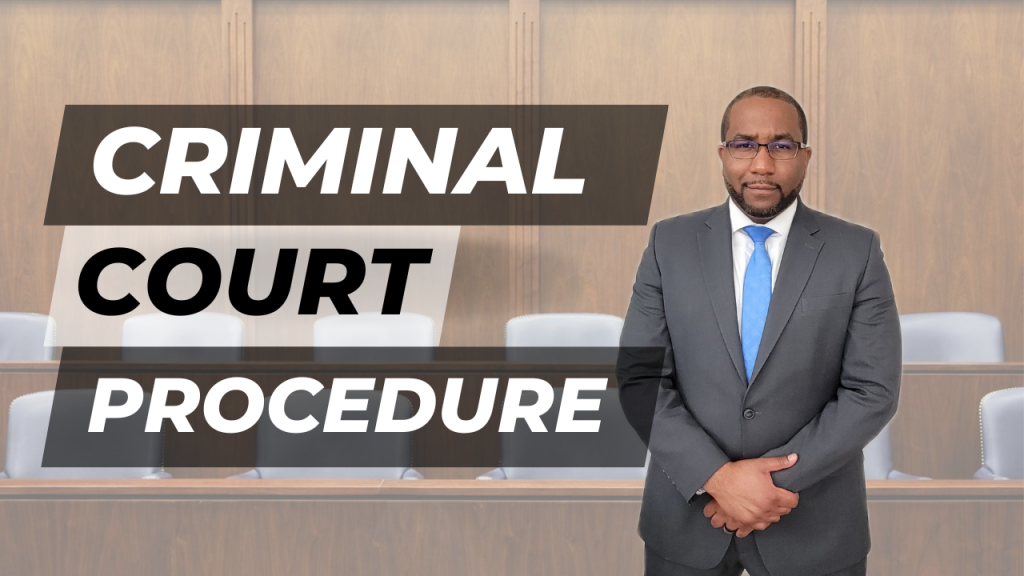
Everything You Need to Know about the Criminal Case Process
Criminal Defense Lawyer Serving Cook, DuPage, DeKalb, Grundy, Kane, Kankakee, Kendall, LaSalle, Lee, Ogle, and Will Counties
If you are facing criminal charges or know someone who is, it is essential to understand the steps of the criminal case process. This knowledge can help you navigate the legal system with confidence and increase your chances of a good outcome. In this article, Criminal Defense Attorney Clyde Guilamo breaks down the various stages of a criminal case and provides a comprehensive guide to navigating the criminal justice system.
Table of Contents – Criminal Case Process
| Step 1. The Criminal Investigation |
| Step 2. Arrest and Booking |
| Step 3. Bond Hearing |
| Step 4. Grand Jury Indictment vs. Preliminary Hearing |
| Step 5. The Arraignment |
| Step 6. Discovery |
| Step 7. The Offer / Plea Negotiations |
| Step 8. Pre-trial Motions |
| Step 9. Trial |
| Step 10. Post-Trial Motions |
| Step 11. Appeal |
| Other Resources |

Step 1: The Criminal Investigation (First Step of Criminal Case Process)
All criminal cases start with an accusation that someone committed a crime. Sometimes, the source of the accusation is from an officer’s own observation (i.e. most traffic tickets). However, the vast majority of crimes begin with an accusation by some other source (i.e., a private person, a security system, or even an anonymous person). Sometimes, the credibility of the source is suspect. As a result, there are two questions that must be answered in every police investigation, what happened and who did it.
Tips if Police are Criminally Investigating You
At this stage, you have constitutional protections from government actions. The two major ones are 1) your 4th Amendment right to be free from unreasonable searches and seizures, and 2) your 5th amendment right against self-incrimination. Stated differently, 1) You do not have to give consent to an officer to search your person or things, and 2) You do not have to tell the police what happened.
Step 2: Arrest and Booking
After the investigation, Police usually arrest the suspect. Officers can arrest you if they have probable cause that you committed a crime. Once the suspect is arrested, they are taken to a police station for booking. During the booking process, the suspect’s personal information, including their name, address, and date of birth, is recorded. The suspect’s fingerprints and photographs are also taken, and they are informed of their rights.
Tips for Arrest and Booking Procedure
Sometimes, police try to get additional evidence out of you after the arrest. Your right against self-incrimination and against unreasonable searches and seizures apply at this stage too. Although it is customary to answer booking questions like “what is your phone number,” if you think that the police will use that information against you (i.e., cases of harassment of a witness or any case in which a cell phone was used for anything like contacting the victim), then you can choose to not answer that question or to give the police your mother’s phone number.
Step 3: Bond or Bail Hearing
Not all people who are arrested remain in jail. The first hearing after an arrest is called a bond hearing, where the judge must weigh whether to release you because you are presumed innocent, or to keep you in custody to protect the victim or public. When determining what to do, judges look at several factors including:
- Your criminal history;
- The seriousness of the accusation in this case;
- The likelihood of you returning to court;
- Other non-incarceration conditions available to the judge (i.e., electronic monitoring, curfew, or home confinement); and
- The strength of the State’s case.
In addition to bond conditions, the judge can make you put up money prior to your release from jail. This is known as bail. The theory behind bail is that if the State holds on to enough of your money, they can pressure you into complying with the bond conditions. If you fail to comply with the judge’s pre-trial conditions, then you can lose or forfeit that bail money.
Tips for your Bond Hearing
You should have an in-depth conversation with your lawyer regarding what you were doing prior to your arrest. In your meeting, you should tell your lawyer any reason that supports releasing you from custody, such as:
- A job;
- Substance Abuse / Anger Management / Mental Health Treatment;
- Family;
- Community Service;
- Your ability to comply with bond conditions (i.e., living elsewhere in a domestic battery case, surrendering your gun in a firearm case, etc.);
- Medical Conditions for you or close relatives;
- School; and/or
- Military Service.
Step 4: Preliminary Hearing vs Grand Jury Indictment
In Illinois, if the State accused you of committing a felony, then the case may only proceed after a preliminary hearing or a Grand Jury indictment. In both hearings, the prosecutor presents evidence to show that there is probable cause to believe that you committed a crime. Here are the main differences:
- In a preliminary hearing, the judge decides if there is probable cause. If the judge finds that there is probable cause, the case proceeds to trial. If the judge does not find probable cause, the case is dismissed. In a grand jury indictment, at least 9 people of the 12 to 16 grand jurors must concur that the evidence before them constitutes probable cause that a person has committed an offense. 725 ILCS 5/112-4(d). If less than 9 people believe there is enough evidence, the case is dismissed.
- In a preliminary hearing, the defendant has the right to cross-examine the State’s witnesses and argue to the Court why there was no probable cause to arrest. With the grand jury, however, the defendant does not get the chance to cross-examine witnesses or argue for no probable cause.
Tips for a Preliminary Hearing
Don’t get your hopes up as over 99% of cases get pass this stage of the process. Stated differently, getting a case dismissed at the preliminary hearing stage is very rare. You should discuss the facts of your case with your lawyer as soon as possible so that he can research case law and have it ready on the issue of probable cause.
Step 5. The Arraignment
The next step in a criminal case is arraignment, where three things happen:
- The judge reads the charges;
- The judge explains your rights and possible penalties based on those charges; and
- You enter a plea on the charges.
Tips for the Arraignment Hearing
Assuming that you have already hired a lawyer, then there is nothing for you to do. Just dress to impress and let your lawyer do your talking for you.
Step 6: Discovery
During the discovery phase, your lawyer receives the police reports, 911 calls, photos, videos and any other items that the State will use as evidence. This can include witness statements, lineups, laboratory reports, and business records.
Tips for Discovery Phase
Communication is key here. If there is evidence that the State does not need or want to get, but is helpful to your case, then you should tell your lawyer. Your lawyer has the right to issue subpoenas to get the things that you need for trial.
Step 7: The Offer / Plea Negotiations
After you have had a chance to review your discovery, you should have a good idea of what evidence the State has against you and your likelihood of success at trial. Before deciding that you would like to go to trial, you should know what the State would offer in exchange for a plea of guilty. There’s no obligation that you accept their offer, but you should know what’s on the table before you leave the fate of your case on a judge or jury.
Tips for Plea Negotiations
In the realm of plea negotiations, Mitigation is King! Mitigation is so important, that I wrote an entire guide on mitigation alone.
Step 8: Pre-Trial Motions
Before the trial begins, both the defense and prosecution can file pre-trial motions (also known as Motions In Limine). Pre-trial motions can do different things, like exclude (or suppress) evidence from coming in at trial, allow you to use evidence that is generally not allowed in at trial, dismiss charges, or even change the location where the trial will take place.
Some motions are so important that winning the motion can result in the State dismissing the case. But do not judge the quality of your lawyer by whether he or she has filed pre-trial motions. The decision to file a pre-trial motion is case specific, and some cases are not eligible for motions.
Tips for Pre-Trial Motions
If you think that police gathered evidence illegally, then you should have a conversation with your lawyer.
Step 9. Trial
The trial is the stage where the prosecution presents evidence to prove that the defendant is guilty of the crime charged. The defense presents their case and attempts to show that the prosecution did not meet their burden of proof (i.e., proof beyond a reasonable doubt) or that some affirmative defense applies (i.e. self-defense).
In a jury trial, the jury decides whether the defendant is guilty or not guilty. However, the judge decides whether the defendant is guilty or not guilty in a bench trial. If the jury cannot reach a verdict, a mistrial is declared, and the case may be retried. There is no such thing as a hung verdict on a bench trial as the judge will decide the outcome.
Step 10: Post-Trial Motions
Unfortunately, you lost the case. In some cases, however, there may have been evidence that was admitted against you that that should have been excluded. Now is not the time to be sitting around feeling down. The law gives you 30 days to write a post-trial motion. Typically titled “a Motion for New Trial,” a post-trial motion is your chance to explain all the errors that were made during the trial, and what should be done as a result of those errors.
Tips for Post-Trial Motions
While your lawyer is drafting this motion, you should be preparing for the sentencing hearing. If you did not prepare mitigation pre-trial, or have items to add, then start getting those items together for your lawyer and ultimately, the judge. This is a great time to gather character letters or letters of support (here is my guide to character letters in criminal cases).
Step 11: Sentencing
Before the trial begins, both the defense and prosecution can file pre-trial motions (also known as Motions In Limine). Pre-trial motions can do different things, like exclude (or suppress) evidence from coming in at trial, allow you to use evidence that is generally not allowed in at trial, dismiss charges, or even change the location where the trial will take place.
Tips for Sentencing
You have a chance to make a statement in allocution. You can pretty much talk about whatever you want, but here is what you should not do:
- Attack the Victim. The best way to upset the judge and get the worst outcome is to claim that this was the victim’s fault. No matter how upset you are, you should not talk badly about the victim. A heart-felt apology or no comment at all is a better option.
- Excuse your behavior. If you start giving excuses for why you committed the crime, then the judge will interpret that as someone who does not take responsibility for his/her actions.
- Treat this hearing as a post-trial motion. This is not your post-trial motion, where the judge allows you to say that errors were made in the criminal case process. This is a sentencing hearing, where the judge is going to decide your punishment.
Step 12: The Appeal (Final Step of Criminal Case Process)
After a sentencing hearing, a defendant can appeal the verdict, the sentence, or both the verdict and sentence. Your grounds on appeal are limited to the grounds you raised in your post-trial motions. In many cases, the State Appellate Defender’s Office handles appeals for people sentenced to the Illinois Department of Corrections.
Tips for the Appeal of the Criminal Case Process
Most trial lawyers are not appellate lawyers. If you lost at trial and are considering filing an appeal, then you should start researching the lawyer that will handle the appeal immediately. You only have 30 days to file for an appeal, so the sooner you start the search the better.
Other Legal Resources
Thank you for reading this guide to the Criminal Court Process. If you are looking for information about:
- Domestic Violence Cases, then check out our Domestic Violence guides.
- Drug Cases, then check out our Drug Crime guides.
- DUI/Traffic Cases, then check out our DUI guide.
- Gun Cases, then check out our Gun Crime guides.
- Sex Cases, then check out our Sex Crime guides.
- Theft Cases, then check out our Theft Crime guides.
- Violent Cases, then check out our Violent Crime guides.
Don’t handle the Criminal Case Process alone. Hire Criminal Defense Attorney Clyde Guilamo
Navigating the criminal justice system can be overwhelming and complex. This guide to understanding the criminal case process can help you or your loved one prepare for what’s to come. Remember that if you are facing criminal charges, it’s important to seek the advice of a criminal defense attorney. He or she can provide guidance and help you protect your rights throughout the process. Lastly, I hope this guide of free legal education was helpful. #notlegaladvice. If you found this article helpful, then consider giving us a review on Google! If you have specific questions about your case, then call me today for a free consultation:


